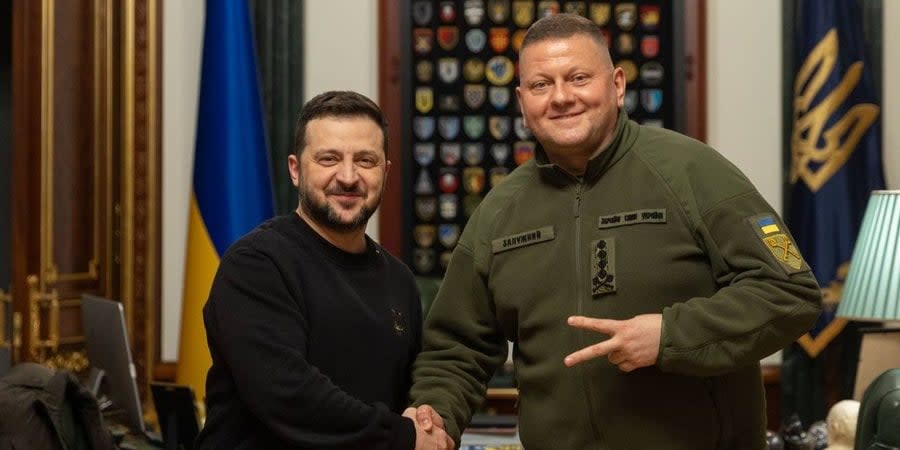Concerns about Zaluzhnyi’s role as ambassador to London – expert interview

- Oops!Something went wrong.Please try again later.
- Oops!Something went wrong.Please try again later.
Ukrainian President Volodymyr Zelenskyy has appointed former Ukrainian Commander-in-Chief Valerii Zaluzhnyi as the country’s Ambassador to the United Kingdom.
Viktor Shlinchak, chairman of the board of the Institute of World Policy, spoke about what preceded the appointment and outlined the concerns about the general’s future diplomatic endeavors, in an interview with NV Radio on May 9.
NV: With this whole story, when Zaluzhnyi was announced as Ukraine’s new ambassador to the UK before getting approval from London, this was a slight breach of diplomatic protocol. Did that affect the appointment somehow?
Shlinchak: The United Kingdom expected a different candidate than the one offered. It’s no longer a secret that incumbent Foreign Minister [Dmytro] Kuleba was supposed to get posted to London at one time. Instead, there was a political decision to appoint Zaluzhnyi.
You’re right that the agrément procedure was violated. This is such a secret letter that is always sent to the receiving state, which must approve a candidate. But until this agrément returns with approval, the posting state has no right to announce that it’s proposing a specific candidate.
And this was actually the biggest miracle, because all diplomatic textbooks state that this procedure takes place in secret. Meanwhile, our Foreign Ministry simply announced this procedure on its website.
But, in my opinion, the Brits decided there’s no need to make fuss about it, so they accepted the candidacy submitted by Kyiv. The agrément was received only two weeks ago if I’m not mistaken. Until that time, Zaluzhnyi hadn’t been dismissed from the Armed Forces of Ukraine, and this could only be done by a presidential decree, which happened today [May 9] or yesterday evening.
The next step — the decree appointing the new ambassador — has now taken place. A Foreign Ministry directive to dispatch Zaluzhnyi to London should follow. That is, even after the presidential decree, the whole procedure isn’t over yet.
Read also: Presidential decree dismisses former Ukrainian Commander-in-Chief from military service
NV: There were rumors that former Defense Minister Oleksii Reznikov would be the news ambassador. Was this mere speculation or was there a change in decision-making? How did the story end?
Shlinchak: Representatives [of foreign nations], in particular embassies, are asked in advance how they would react if a given candidate was tapped to be sent to their countries.
You’re talking about Reznikov, but he was preceded by the name of Yuriy Husyev, former CEO of Ukraine’s state-owned defense conglomerate Ukroboronprom. As far as I know, there were preliminary verbal negotiations regarding both these candidates. But it wasn’t formalized, as it was done with Zaluzhnyi.
NV: To be honest, I didn’t see even a hint that the British expected Kuleba to be the next ambassador. Why him? Is his work as Foreign Minister no longer satisfactory, or was there someone else better suited for the job?
Shlinchak: Let’s speak in half-hints because we don’t have 100% reliable information. But the appointment of [former Deputy Head of the President’s Office] Andrii Sybiha as First Deputy Foreign Minister, who started giving orders... We remember there was an order to suspend consular services to draft-eligible Ukrainians abroad. It was quite controversial. This means that Mr. Kuleba now at least shares areas of responsibility with his deputy, who was reassigned, as you recall, from the President’s Office.
Read also: President Zelenskyy appoints Valerii Zaluzhnyi as new Ambassador to the UK
NV: Will Zaluzhnyi be free to act in his new position, or will there still be some control exerted from Kyiv?
Shlinchak: I know that Zaluzhnyi has spent all this time (for over two months) studying various diplomatic regulations and acts. He studied at the military-diplomatic academy and held consultations with certain structures regarding the activities of embassies. That is, he got into the swing of things how the embassy works.
But I’ll say frankly. This is, perhaps, my subjective opinion and my subjective fear, which may be the following: we may lose an excellent military officer and get, let’s say, an underqualified envoy.
All the latest personnel decisions related to the appointment of certain ambassadors evoke similar reservations. Because most of our ambassadors are political appointees, not career diplomats.
I even joked that we can probably gather an entire Cabinet of [former] Ministers in exile. Today I also joked that maybe [dismissed Deputy Prime Minister Oleksandr] Kubrakov will now apply for a position in one of the embassies, given that his career in the Cabinet is over.
NV: Many said that Zaluzhnyi would only step up the military component of our cooperation with the United Kingdom and could clearly explain what kind of military aid we need. Do you agree with this?
Shlinchak: You know, if it was an appointment to the NATO headquarters (by the way, we have an envoy there, but it seems to me his term of office is already running out), it would indeed be more logical to appoint Zaluzhnyi to NATO HQ.
But in this case, to convey some issues, I think it would be enough to strengthen the military attaché’s hand. Almost every embassy has a military attaché who can communicate these matters. So, I don’t see much added value here in that regard.
We’re bringing the voice of Ukraine to the world. Support us with a one-time donation, or become a Patron!
Read the original article on The New Voice of Ukraine

